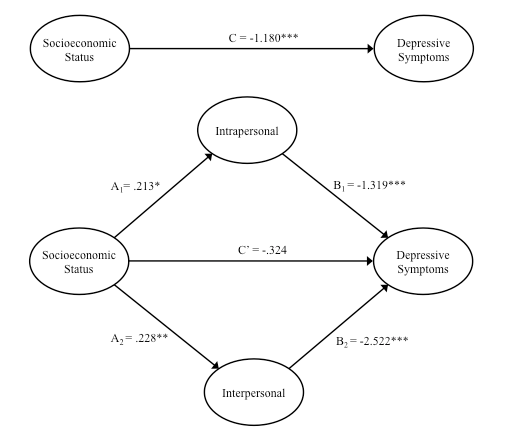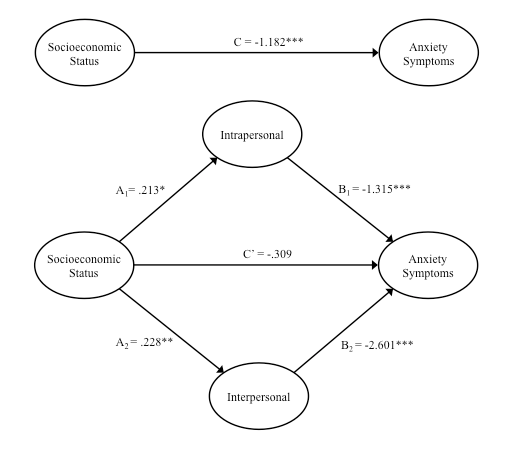Session Information
Date: Monday, November 9, 2015
Title: ARHP II: Lupus
Session Type: ARHP Concurrent Abstract Session
Session Time: 2:30PM-4:00PM
Background/Purpose: The purpose
of this study was to assess the influence of socioeconomic status (SES) and measures
of reserve capacity on depression and anxiety in patients with systemic lupus erythematosus (SLE). We examined whether reserve
capacity/psychosocial variables explained the relationship between SES and
levels of depression/anxiety in two separate meditation models. Methods: One
hundred twenty-eight patients from Southern California with SLE completed self-report
measures of demographic factors, disease activity (SLE Disease Activity Index),
depression/anxiety (Hospital Anxiety and Depression Score), self-esteem
(Rosenberg Self-Esteem Scale), social support (Social Provisions Scale), life
orientation and optimism (Life Orientation Test – Revised), personal
mastery (Personal Mastery Scale), and helplessness (Arthritis Helplessness
Index). Two multiple meditational analyses were conducted utilizing an SPSS
macro called “Indirect” (Preacher & Hayes, 2008), a program known to reduce
complications with Type I Error and statistical power in multiple mediation
models. Results: Results of confirmatory factors analyses revealed that social
support variables made up an “interpersonal” latent factor; personal mastery,
self-esteem, helplessness, and optimism variables made up an “intrapersonal”
latent factors; and income, education, and perceived income made up an “SES”
latent factor. Multiple mediation results revealed that, after controlling for
disease activity and disease duration, features of reserve capacity including
self-esteem, personal mastery, helplessness, optimism, and life orientation fully
mediated the relationship between SES and depression/anxiety. After controlling
for disease activity and disease duration, SES increased by one point and symptoms
of depression decreased by .281 and .592 points through the mediating effects
of interpersonal and intrapersonal reserve capacity, respectively. Additionally,
as SES increased by one point, symptoms of anxiety decreased by .281 and .574
points through the mediating effects of interpersonal and intrapersonal reserve
capacity, respectively. Conclusion: Results indicate that lower SES is
indirectly associated with higher levels of depression and anxiety through the
effects of lower psychosocial resilience resources. Providing interventions
aimed at modifying reserve capacity variables, such as self-esteem, optimism,
and sense of control may ultimately improve anxiety and depressive
symptomatology in patients with SLE.
To cite this abstract in AMA style:
Azizoddin D, Ayeroff J, Zamora-Racaza G, Draper T, Ormseth SR, Weisman MH, Sumner L, Nicassio PM. Reserve Capacity: Explaining the Link Between Socioeconomic Status and Depression/Anxiety Among Patients with Systemic Lupus Erythematosus [abstract]. Arthritis Rheumatol. 2015; 67 (suppl 10). https://acrabstracts.org/abstract/reserve-capacity-explaining-the-link-between-socioeconomic-status-and-depressionanxiety-among-patients-with-systemic-lupus-erythematosus/. Accessed .« Back to 2015 ACR/ARHP Annual Meeting
ACR Meeting Abstracts - https://acrabstracts.org/abstract/reserve-capacity-explaining-the-link-between-socioeconomic-status-and-depressionanxiety-among-patients-with-systemic-lupus-erythematosus/


